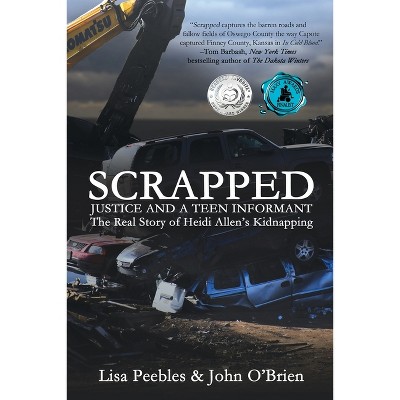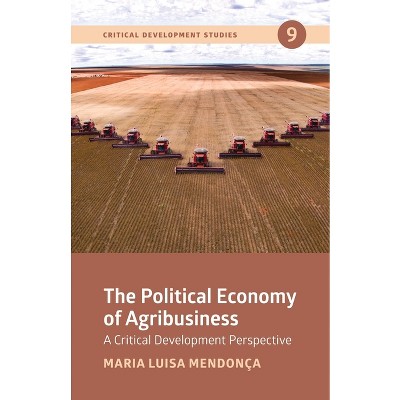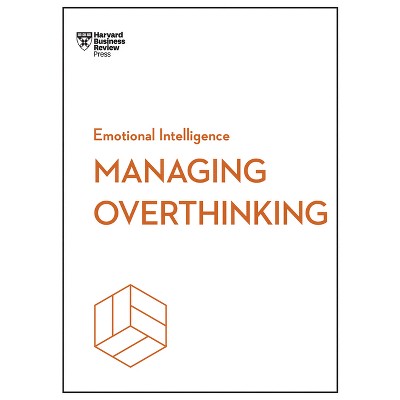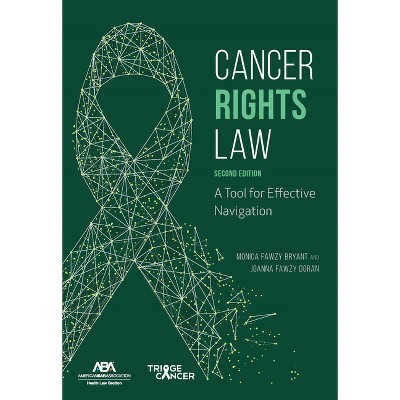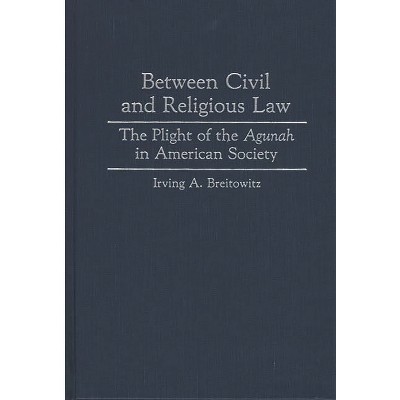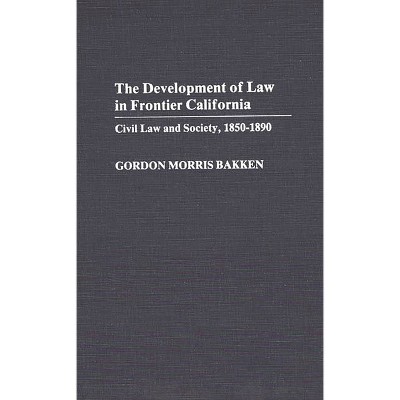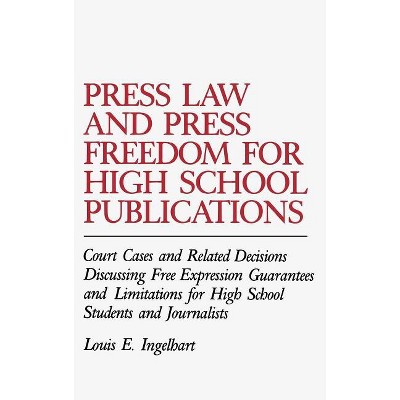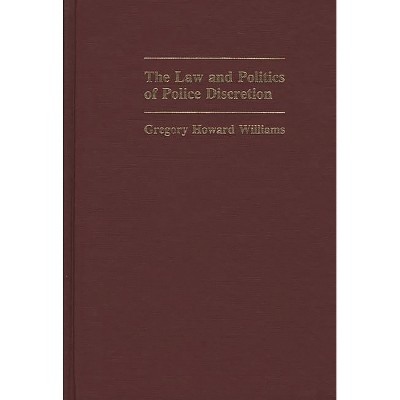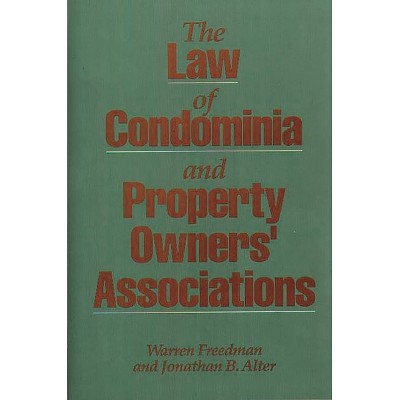Sponsored

Environmentally Induced Cancer and the Law - by Frank B Cross (Hardcover)
In Stock
Sponsored
About this item
Highlights
- Frank Cross provides a comprehensive treatment of the widely feared problem of environmentally induced cancer.
- About the Author: FRANK B. CROSS is Associate Professor of Business Law at the University of Texas and Associate Director of the Center for Legal and Regulatory Studies.
- 244 Pages
- Freedom + Security / Law Enforcement, Civil Procedure
Description
About the Book
Frank Cross provides a comprehensive treatment of the widely feared problem of environmentally induced cancer. The author takes a threefold approach to the problem, first examining the cancers themselves and what is known about their causes and then exploring both the government's regulation of these environmental pollutants and the legal remedies available to victims of such cancers. Throughout, new proposals for regulating carcinogens and compensating the victims of environmental cancer are discussed.
In Part I, Cross addresses the significant and unique problems presented by the disease of cancer, demonstrating that the limits of scientific knowledge, the absence of a demonstrable safe threshold of exposure and other special features of the disease create a unique cancer problem for government. The second section examines the various risk-management approaches from which a regulatory agency may choose. As Cross demonstrates, government must identify carcinogens, assess the risks they present, and choose control methods--a complex task made even more difficult by the conflicting claims of industry and environmental groups. He concludes this section by proposing future approaches for more effective regulation, including prioritization of the greatest hazards and adoption of a moderate, feasibility-based control program. The final chapters explore legal obstacles to victim compensation and argue for fundamental changes in existing common law doctrines to enhance the ability of victim/plaintiffs to recover adequate damages.
Book Synopsis
Frank Cross provides a comprehensive treatment of the widely feared problem of environmentally induced cancer. The author takes a threefold approach to the problem, first examining the cancers themselves and what is known about their causes and then exploring both the government's regulation of these environmental pollutants and the legal remedies available to victims of such cancers. Throughout, new proposals for regulating carcinogens and compensating the victims of environmental cancer are discussed.
In Part I, Cross addresses the significant and unique problems presented by the disease of cancer, demonstrating that the limits of scientific knowledge, the absence of a demonstrable safe threshold of exposure and other special features of the disease create a unique cancer problem for government. The second section examines the various risk-management approaches from which a regulatory agency may choose. As Cross demonstrates, government must identify carcinogens, assess the risks they present, and choose control methods--a complex task made even more difficult by the conflicting claims of industry and environmental groups. He concludes this section by proposing future approaches for more effective regulation, including prioritization of the greatest hazards and adoption of a moderate, feasibility-based control program. The final chapters explore legal obstacles to victim compensation and argue for fundamental changes in existing common law doctrines to enhance the ability of victim/plaintiffs to recover adequate damages.Review Quotes
?. . . Frank B. Cross examines the United States' scientific, regulatory, and legal responses to chemical exposures in the environment, especially exposures resulting from air pollution, water pollution, and hazardous waste. . . . In the last section of his book, Cross does break new ground. After reviewing current administrative and tort law procedures, he proposes a series of reforms, including the possibility that some chemical risks should be compensable and compensated before the appearance of any resulting illness.?-Environment
?. . . On the whole, Environmentally Induced Cancer and the Law provides an excellent introduction to the field of carcinogen regulation and response. Excellent factual summaries and clear descriptions of issues will keep even readers with no scientific background on track. The book contains numerous references for those who wish to pursue further information. . . . Overall, Cross is democratic in his analysis and proposals for reform. Even if the reader does not agree with Cross's conclusions, the book's real strength is in presenting all sides of the issues in a fair and lucid fashion.?-Harvard Environmental Law Review
?. . .This book is highly recommended for all but the smallest libraries. Insofar as many interested persons lacking legal (as well as technical) background will be able to follow it, it should be considered by general and technical as well as legal libraries. Yet even the most sophisticated readers are apt (regardless of the side of either of two fences on which they find themselves) to find the book of more than passing interest.?-Law Books in Review
?Cross relies upon his expertise in law to depict the current state of affairs of environmentally induced cancer. He approaches the phenomenon threefold: first, he briefly examines cancers and what is known about their causes; then he explores both the government's regulations of carcinogenic environmental pollutants and the legal remedies available to victims of such cancers. The author reiterates the recurring theme of existing imperfections in current regulatory and judicial remedies. However, he does offer several incremental environmental reforms, which include strengthening current risk assessment/risk management paradigms. In essence, Cross advocates relegating the process to a pragmatic level that requires an increased federal regulatory role, while fostering the ability of US business to remain competitive in a global economy. The inclusion of an index and bibliography help balance the increasing complexity of the information in Part 3; readers would need some exposure to the legal sciences to fully interpret and comprehend some of the terminology used. This is definitely not for general readers, but would be useful to those interested in the regulatory process. Appropriate for graduate and professional collections in environmental law of health.?-Choice
?Cross' treatment is well integrated and comprehensive. After a technical overview (two chapters), he tries to show that many public fears are overblown and that the most serious risks are posed by things which individuals control (e.g., tobacco). Yet, he also tries to demonstrate that zero-tolerance levels for carcinogens, e.g., the Delaney clause, are supportable insofar as it has been impossible to find minimum thresholds. Having laid a technical foundation, Cross then discusses the federal regulation of carcinogens (in 4 chapters) and common law liability for environmental carcinogens (in 3 chapters). Regarding the latter, he suggests that easier recovery in private actions would be an effective supplement to regulation. This is offset by recognizing the need for control of punitive damages--lest early victims leave nothing for later recovery.?-I Risk
." . . Frank B. Cross examines the United States' scientific, regulatory, and legal responses to chemical exposures in the environment, especially exposures resulting from air pollution, water pollution, and hazardous waste. . . . In the last section of his book, Cross does break new ground. After reviewing current administrative and tort law procedures, he proposes a series of reforms, including the possibility that some chemical risks should be compensable and compensated before the appearance of any resulting illness."-Environment
." . . On the whole, Environmentally Induced Cancer and the Law provides an excellent introduction to the field of carcinogen regulation and response. Excellent factual summaries and clear descriptions of issues will keep even readers with no scientific background on track. The book contains numerous references for those who wish to pursue further information. . . . Overall, Cross is democratic in his analysis and proposals for reform. Even if the reader does not agree with Cross's conclusions, the book's real strength is in presenting all sides of the issues in a fair and lucid fashion."-Harvard Environmental Law Review
." . .This book is highly recommended for all but the smallest libraries. Insofar as many interested persons lacking legal (as well as technical) background will be able to follow it, it should be considered by general and technical as well as legal libraries. Yet even the most sophisticated readers are apt (regardless of the side of either of two fences on which they find themselves) to find the book of more than passing interest."-Law Books in Review
"Cross' treatment is well integrated and comprehensive. After a technical overview (two chapters), he tries to show that many public fears are overblown and that the most serious risks are posed by things which individuals control (e.g., tobacco). Yet, he also tries to demonstrate that zero-tolerance levels for carcinogens, e.g., the Delaney clause, are supportable insofar as it has been impossible to find minimum thresholds. Having laid a technical foundation, Cross then discusses the federal regulation of carcinogens (in 4 chapters) and common law liability for environmental carcinogens (in 3 chapters). Regarding the latter, he suggests that easier recovery in private actions would be an effective supplement to regulation. This is offset by recognizing the need for control of punitive damages--lest early victims leave nothing for later recovery."-I Risk
"Cross relies upon his expertise in law to depict the current state of affairs of environmentally induced cancer. He approaches the phenomenon threefold: first, he briefly examines cancers and what is known about their causes; then he explores both the government's regulations of carcinogenic environmental pollutants and the legal remedies available to victims of such cancers. The author reiterates the recurring theme of existing imperfections in current regulatory and judicial remedies. However, he does offer several incremental environmental reforms, which include strengthening current risk assessment/risk management paradigms. In essence, Cross advocates relegating the process to a pragmatic level that requires an increased federal regulatory role, while fostering the ability of US business to remain competitive in a global economy. The inclusion of an index and bibliography help balance the increasing complexity of the information in Part 3; readers would need some exposure to the legal sciences to fully interpret and comprehend some of the terminology used. This is definitely not for general readers, but would be useful to those interested in the regulatory process. Appropriate for graduate and professional collections in environmental law of health."-Choice
About the Author
FRANK B. CROSS is Associate Professor of Business Law at the University of Texas and Associate Director of the Center for Legal and Regulatory Studies. His numerous articles have appeared in publications such as the Emory Law Journal, Vanderbilt Law Review, Administrative Law Review, Harvard Environmental Law Review and Environmental Affairs Law Review.Shipping details
Return details
Frequently bought together
